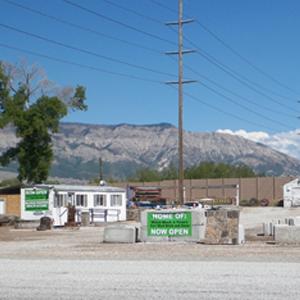


After 25 years of providing custom brick and concrete work, including pavers, waterfalls and retaining walls, Wisco was forced to close its doors in Brigham City due to the economic turndown. Despite selling inventory, equipment and several acres of commercial property to pay bills and provide for his family, owner Cory Wilkes was determined to one day reopen Wisco.
Wilkes father-in-law, Kent Malan, offered to rent a portion of his property in Farr West for Wilkes to start. Though the property was substantially smaller than the original Wisco location, Wilkes believed he could start his business with a simple waterfall and sign with his company logo and phone number on it and slowly expand as his customer base and income increased. However, City code would not allow that, so Wilkes began the extensive, exhausting and expensive process of establishing a business in Farr West.
Wisco first applied for a business license to operate in Farr West in January 2013, but the request was put on hold until Wilkes could work with the City Planning Commission to create and have a site plan approved that included several requirements that would ensure the property met City codes for a business location.
Planning Commissions are established under the direction of the mayor and city councils to help with the development and maintenance of a city. They are delegated most of their authority and responsibility through city codes and ordinances that determine criteria for development and operation. While some state and county laws influence these codes, the majority of business operating laws is left to individual cities to establish.
Though duties vary among cities, planning commissions are generally in charge of zoning, recommending regulations for subdivisions and ensuring that all buildings—commercial, residential and government—are safe and properly maintained for the safety of all residents and visitors to the city. Other jobs include maintenances of roads and walkways, including snow removal, coordinating garbage pickup for its residents, access to water and sewage services, and the creation and upkeep of city parks.
Since Wilkes was establishing a new business on property recently zoned commercial, he was required to pay for water and sewer lines and a fire hydrant to be installed. He had to landscape the property and include in the site plan the exact placement of every tree, shrub and flower.
Wisco finally opened its doors late last summer, after investing over $200,000 in development and upgrades, on a conditional-use permit. This means Wisco can operate, but Wilkes must meet several more city requirements by June or risk losing his business altogether. This will cost more money in order to ensure Wisco can keep its doors open, even though Wisco hasn’t been open during a normal season in order to help bring in the funds to help pay for these changes.
One of these requirements is the placement of a fence to separate Wisco from the residential property next door. That resident is property owner, Malan, who has repeatedly stated he doesn’t want a fence splitting his property, even if there are different zones. Malan foresees the entire property one day becoming commercial and feels the fence is not only a waste of money, but a violation of his personal rights. Since he owns the property he feels he should have the right to erect a fence or not. Wilkes plans to comply with the City ordinance so that he can keep working and support his family, but he still feels frustrated.
“I understand why there are ordinances. The City wants to make sure everyone is safe and there isn’t an eyesore in the community. But they sure do make it difficult for someone to start a business and make an honest living.” Not to mention creating new jobs. When fully open, Wilkes says Wisco will easily have 10 full-time, year-round employees.
Another Planning Commission requirement Wilkes must meet is an asphalt-paved access drive. Wilkes had wanted to use pavers or gravel since it is a service offered by Wisco and a nice way to showcase the quality of this service to potential customers. However, City code prohibits the use of anything but asphalt.
“It isn’t right to have an ordinance that doesn’t consider each individual circumstance,” Wilkes said. “Some city codes just can’t be logically followed by everyone.”
Those ordinances also don’t seem to be enforced equally throughout the City. Several commercial businesses throughout Farr West don’t have fences, asphalt driveways, or landscaping. A quick search of public records shows that at least one commercial business is operating within the City on a home-business license. Wilkes feels that if the Planning Commission is going to require that Wisco follow every City ordinance that every business in Farr West should too.
“I just don’t get why they are getting on me when there are other businesses in the City that are not in compliance.”
Wilkes plans on having all the regulations met before the June deadline so that he will finally receive his permanent license. But, he hopes the City Council will consider their current ordinances, and perhaps update them, so that it is easier for small business and startup business owners, like himself, to have an easier chance of starting a business, fulfilling the American dream and providing for their families.